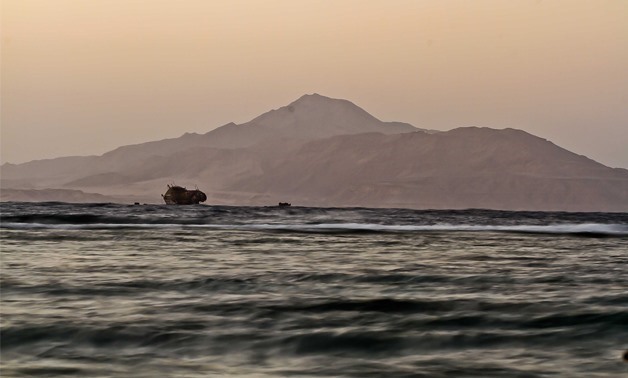
Tiran Island – File photo/Hussein Tallal
CAIRO – 7 June 2017: A recent study conducted by Egyptian constitutional law professor Salah Fawzy provides new facts that Saudi Arabia does indeed have sovereignty over the two disputed Red Sea islands of Tiran and Sanafir.
Fawzy told Egypt Today that his study was based on a number of maps, agreements and research documents.
Senior officials and law professors also added their opinions in regard to the Tiran and Sanafir case.
Mufid Shehab, former minister of state for legal and parliamentary affairs, said that international law does not recognize “ownership” of territory, instead differentiating between “sovereignty” and “administration”.
Shehab, an international law professor, said all geographic and historical evidence affirms Saudi Arabia’s sovereignty over the two islands and Egypt’s agreed role as a temporary administrator of the territory.
He also added during an earlier meeting with parliament representatives that there is no such thing in the international law as “expropriation” or “adverse possession” of territory.
“Temporary administration over a land according to the international law does not mean ownership over this land, unless the land is officially transferred by law,” Shehab said.
“For that matter, Saudi Arabia has been sending messages for decades that it did not abandon the islands.”
Parliament recently referred a maritime demarcation agreement that would have transferred the two Red Sea islands to Saudi Arabia to its Constitutional and Legislative Affairs Committee.
A border demarcation agreement signed in April 2016 stated that the two islands are deemed to be within Saudi territorial waters.
Two different court rulings were issued regarding the agreement; the first, issued by the Supreme Administrative Court, nullified the agreement, while the second verdict, issued by the Summary Proceedings Court, ruled for its validity.
Turning towards the dispute’s historical context, historian Assem Desouki reminded Egypt Today that in 1949 following the 1948 Arab-Israeli War, Israel occupied the town of Umm Al-Rashrash, currently Eilat in southern Israel.
Saudi Arabia requested King Farouk of Egypt protect the two nearby islands by placing them under Egyptian administration, lest Israel could reach Aqaba and penetrate further into the Arabian Peninsula.
Desouki also clarified that Saudi Arabia first moved to reclaim the two islands in 1981, but Middle Eastern geopolitics of the time prevented this from taking place.
Following the signing of the Camp David Accords between Israel and Egypt, Israel asked the United States to pressure Saudi Arabia into claiming back the islands and sign a truce with Israel, but the Saudi Kingdom refused to comply.
He added that Saudi Arabia requested the reclaimation of the islands once again in 1990 to which Egypt agreed, but the timing was not suitable to see the process fully completed.
Sami Sharaf, who served as the late president Gamal Abdel Nasser's political secretary, said that Tiran and Sanafir were only assigned to Egypt to ensure their protection through Egypt’s military capabilities.
In an article published in Al-Ahram newspaper in April 2017, Sharaf said that historical issues such as this should revert back to the way they once were, especially given that the reason these islands were initially demarcated within Egyptian administration does not exist anymore.
Sharaf added in response to rumor-mongers, many of whom come from within the ranks of the Muslim Brotherhood, that it is indeed on record that President Nasser once claimed the two islands as Egyptian. However this was only publically announced with the coordination of Saudi Arabia for a reason related to Egypt’s national security in 1967.
Tiran and Sanafir are located in the narrow entrance to the Gulf of Aqaba in the Red Sea. Egyptian officials say they belong to Saudi Arabia and have been under former Egyptian control only because Riyadh requested Cairo protect them in 1950.

Comments
Leave a Comment